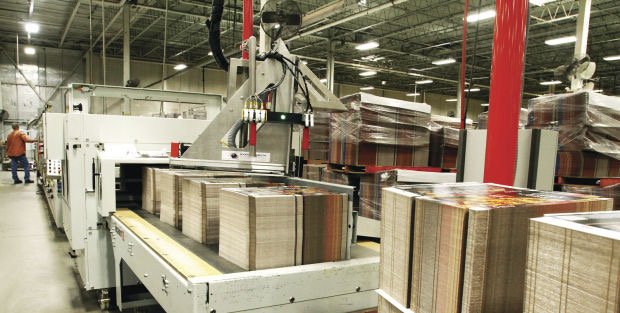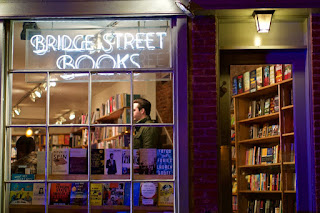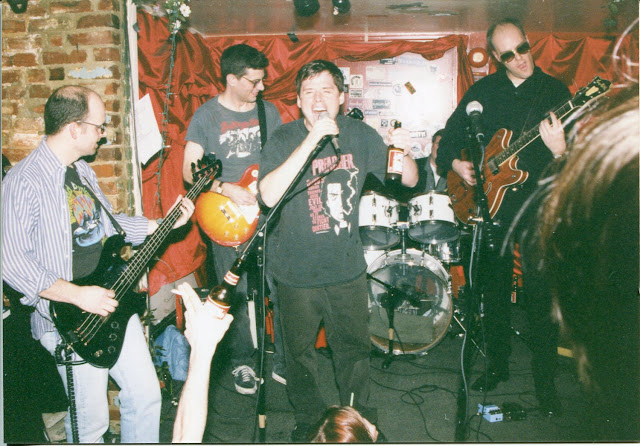Aaron Winslow in Conversation with Leslie Bumstead, Alyse Knorr, and Tom Doyle
Aaron Winslow will read from Jobs of the Great Misery on 1-26-18 at The Black Squirrel in Washington, DC 8:00PM. Join the event on Facebook.
Aaron: I'm
thinking of the Steve Jobs quote that started us off here. It's a
great quote, and I love the reflections that it's prompted here, but I
can't ever think of Steve Jobs outside of the context of work (perhaps
especially right now because I'm scrambling to participate in this
conversation while at my own job)—in particular, the role that he and
Apple have had in making "creativity" a corporate and labor management
concept and for the horrible concept of "creatives." As far as I can
tell, it's thanks to Jobs that I'm supposed to be "creative" even when
I'm doing data entry.
I mean, check out this John Cleese quote: “If you want creative workers, give them enough time to play.”
Could have been spoken by a ruthless tech CEO as he's bulldozing affordable housing to build a staff arcade or something. And If the time I have to be creative is just so that I'm a better "worker," then maybe I don't wanna.
So what I'm wondering is: how do we separate creativity, the good, liberatory kind (like the kind that Leslie helps prisoners tap into, the kind makes cool shit) from Creativity, Inc., the kind that gets easily recuperated by the market? Not looking for a politics of purity here, but just find it interesting that the idea of creativity is so readily associated with a certain style of corporate capitalism—so maybe that's just the parameters we work within.
Leslie: Yes, Aaron, I wondered about that too, with the Jobs quote. Cuz I do like the quote, but not the association with corporate creativity & its desire to devour the idea of creativity.
I don’t know the answer. I fear that capitalism has got us by the balls in a great many ways, and maybe we can resist by first recognizing that the terms are getting mixed up, misused, abused. Not in the sense of purity, as you say, but in the sense of knowing when something is merely rehearsing the status quo (quite violently, as per your example of bulldozing affordable housing while to build a staff arcade) and when something is in fact an act of liberation, or—since that sounds a bit melodramatic—at least an act that interrogates what we know/think we know and what the hell we are doing.
CL: Where was this photo taken?
Aaron: Oh, just an image from the internet that I use as my desktop background.
CL: Job computer, your computer, all of the above?
Aaron: Oh, my personal MacBook.
CL: How do you feel it represents your creative life?
Aaron: Hah! Well, in a few ways: 1) as a reminder (memento mori, if you will) of the constraints on creative life; namely, working shitty jobs; 2) and also as an ironic daily reminder that any art I produce is of the same material as a box—mass-produced, indebted to the commodity and capital, and done under some sort of duress/antagonism; 3) but it’s also an aspirational & inspirational image! bc in a perfect world I could produce writing/art as quickly and seamlessly as this here box factory produces boxes... to have the presence and calm and steadfastness of a box factory... that’s my utopia.
Aaron Winslow's novel, Jobs of the Great Misery (2016), is available from Skeleton Man Press. His fiction, reviews, and essays have appeared in journals such as Social Text Online, Full Stop, Theme Can, P-QUEUE, Smallwork, and Jacket2. He currently works as an archivist at The New School. Additional information and writing can be found at aaron-winslow.com.
Books by Aaron Winslow at Bridge Street Books
Aaron Winslow, Author of Jobs of the Great Misery
“If you want creative workers,
give them enough time to play.”
—John Cleese
I mean, check out this John Cleese quote: “If you want creative workers, give them enough time to play.”
Could have been spoken by a ruthless tech CEO as he's bulldozing affordable housing to build a staff arcade or something. And If the time I have to be creative is just so that I'm a better "worker," then maybe I don't wanna.
So what I'm wondering is: how do we separate creativity, the good, liberatory kind (like the kind that Leslie helps prisoners tap into, the kind makes cool shit) from Creativity, Inc., the kind that gets easily recuperated by the market? Not looking for a politics of purity here, but just find it interesting that the idea of creativity is so readily associated with a certain style of corporate capitalism—so maybe that's just the parameters we work within.
Leslie: Yes, Aaron, I wondered about that too, with the Jobs quote. Cuz I do like the quote, but not the association with corporate creativity & its desire to devour the idea of creativity.
I don’t know the answer. I fear that capitalism has got us by the balls in a great many ways, and maybe we can resist by first recognizing that the terms are getting mixed up, misused, abused. Not in the sense of purity, as you say, but in the sense of knowing when something is merely rehearsing the status quo (quite violently, as per your example of bulldozing affordable housing while to build a staff arcade) and when something is in fact an act of liberation, or—since that sounds a bit melodramatic—at least an act that interrogates what we know/think we know and what the hell we are doing.
CL: Where was this photo taken?
Aaron: Oh, just an image from the internet that I use as my desktop background.
CL: Job computer, your computer, all of the above?
Aaron: Oh, my personal MacBook.
CL: How do you feel it represents your creative life?
Aaron: Hah! Well, in a few ways: 1) as a reminder (memento mori, if you will) of the constraints on creative life; namely, working shitty jobs; 2) and also as an ironic daily reminder that any art I produce is of the same material as a box—mass-produced, indebted to the commodity and capital, and done under some sort of duress/antagonism; 3) but it’s also an aspirational & inspirational image! bc in a perfect world I could produce writing/art as quickly and seamlessly as this here box factory produces boxes... to have the presence and calm and steadfastness of a box factory... that’s my utopia.
Read the rest of the conversation →
Ask Aaron a question in the comments below and share this post ↓
Ask Aaron a question in the comments below and share this post ↓
 |
| Photo Credit: Ryan Collerd |
Aaron Winslow's novel, Jobs of the Great Misery (2016), is available from Skeleton Man Press. His fiction, reviews, and essays have appeared in journals such as Social Text Online, Full Stop, Theme Can, P-QUEUE, Smallwork, and Jacket2. He currently works as an archivist at The New School. Additional information and writing can be found at aaron-winslow.com.
Books by Aaron Winslow at Bridge Street Books
2814 Pennsylvania Ave NW, Washington, DC
Phone: (202) 965-5200
What's your creative utopia? Respond to the conversation with authors in the comments section below, ask Aaron a question, share your favorite quote on creativity, share this post. Thank you—The Creative Life







Comments